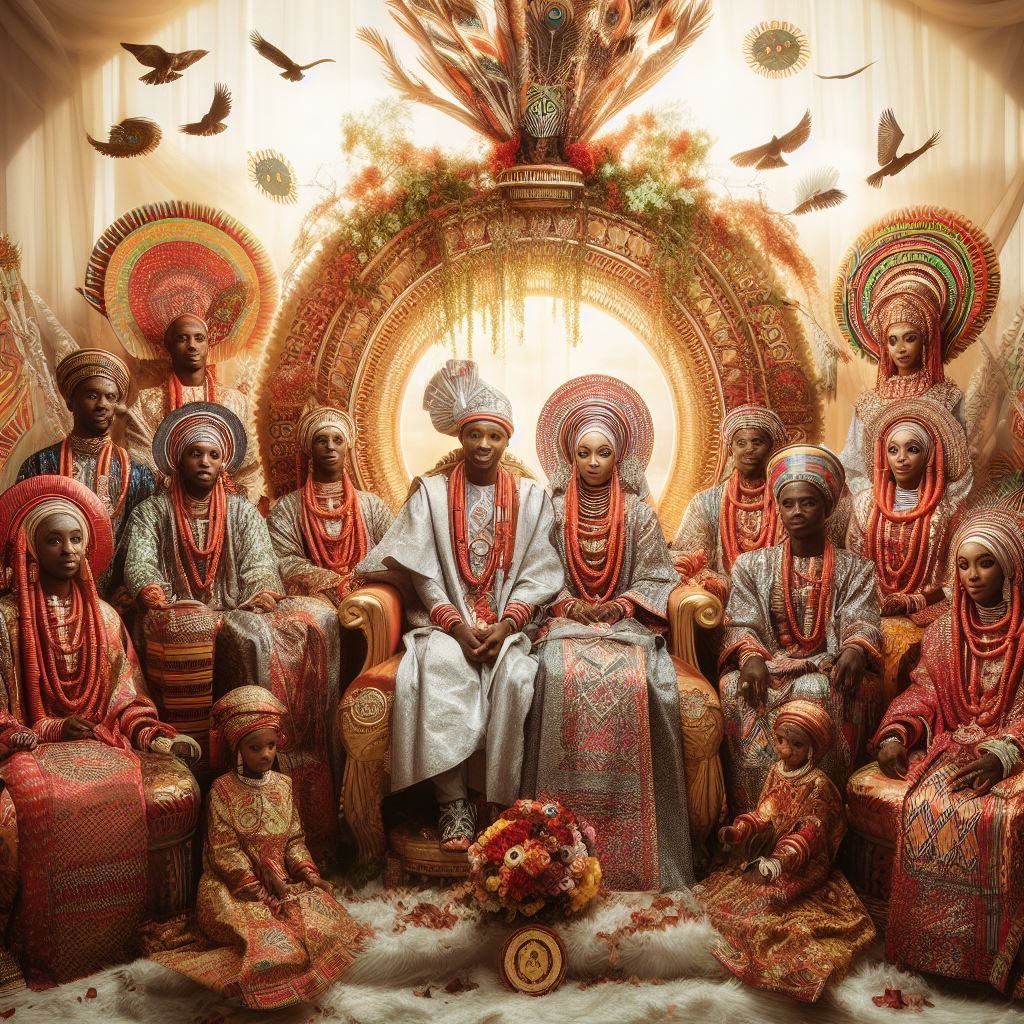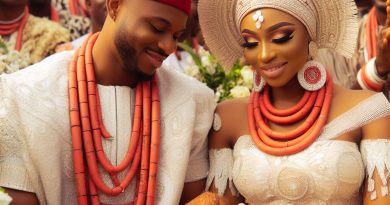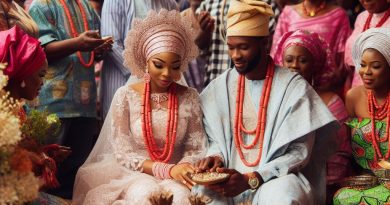Hausa Wedding Traditions: Marriage Messages Explored
Last Updated on January 28, 2024
Introduction
Hausa wedding traditions are rich in culture and carry immense significance in the Hausa community.
One integral aspect of these traditions is the exchange of marriage messages.
These messages play a crucial role in strengthening the bond between the couple and their families.
Marriage messages hold a prominent position in Hausa weddings.
They serve as a means of communication and convey blessings, advice, and good wishes to the couple.
These messages are often presented in the form of poems or songs and are recited by family members and friends during the wedding ceremony.
The importance of marriage messages lies in their ability to foster unity and preserve cultural values.
They carry the wisdom of generations and pass down the traditions and customs that define the Hausa community.
Marriage messages also provide an opportunity for loved ones to express their support and encouragement to the newlyweds as they embark on their marital journey.
These messages enable the couple to feel deeply connected to their heritage and reinforce the bonds between families.
They serve as reminders of the responsibilities and commitments of marriage, promoting a sense of shared values and communal harmony.
Marriage messages hold great significance in Hausa wedding traditions.
They represent the cultural identity of the Hausa people and act as bridges between generations, strengthening familial ties and promoting unity within the community.
Traditional Marriage Messages
Explanation of the concept of marriage messages in Hausa culture
In Hausa culture, marriage messages play a significant role in weddings.
These messages are expressions of well wishes, advice, and blessings for the couple embarking on their marital journey.
Description of the different types of marriage messages
There are different types of marriage messages in Hausa tradition, with verbal and non-verbal forms being the most common.
Verbal messages are conveyed through spoken words, while non-verbal messages are expressed through actions.
Verbal Marriage Messages
- Ku ci gaba da farin ciki – “May your union be filled with joy and happiness.”
- Ba ku sai wawa – “May your marriage be devoid of any troubles or hardships.”
- Allah ya sa mu sauri – “May Allah guide and protect you in your marriage.”
- Barka da zuwa – “Welcome to the new chapter of your lives, may it be fruitful and prosperous.”
Non-Verbal Marriage Messages
- The ceremonial gift exchange – The exchange of gifts between the bride and groom’s families signifies acceptance and support of the union.
- Breaking of the kolanut – The breaking of the kolanut symbolizes unity, harmony, and shared responsibility in the marriage.
- Sprinkling of henna – The bride’s hands and feet are adorned with intricate henna designs, representing beauty, fertility, and auspiciousness.
- Tying the knot: The ceremonial tying of the bride and groom’s hands together signifies their commitment and bond to each other.
Examples of traditional marriage messages exchanged during Hausa weddings
These traditional marriage messages hold great significance in Hausa weddings and reflect the values and aspirations of the community.
For example, the message “Ku ci gaba da farin ciki” not only wishes the couple joy and happiness but also encapsulates the importance of ensuring a joyful and harmonious union.
The message “Ba ku sai wawa” seeks to bless the newlyweds with a marriage free from troubles or hardships, highlighting the community’s desire for a smooth and successful partnership.
Similarly, “Allah ya sa mu sauri” conveys the community’s hope that Allah will guide and protect the couple in their marital journey, emphasizing the religious and spiritual aspect of marriage.
Non-verbal marriage messages, such as the ceremonial gift exchange, signify acceptance and support from both families for the union.
The breaking of the kolanut represents the shared responsibilities and obligations the couple will face together in their marriage.
The sprinkling of henna on the bride’s hands and feet not only enhances her beauty but also symbolizes fertility and luck for the couple’s future.
Tying the knot ceremonially binds the couple together, emphasizing their commitment and dedication to each other.
In essence, marriage messages in Hausa culture are integral to weddings as they convey blessings, well wishes, and aspirations for a successful and harmonious union.
Whether in verbal or non-verbal form, these messages reflect the values and dreams of the community, bringing love and hope to the newlyweds’ journey.
Read: The Role of Dowry in Nigerian Marriage Agreements
Meaning and Symbolism
- Marriage messages in Hausa culture hold symbolic meaning that goes beyond mere communication.
- These messages serve as a form of expression, conveying deep emotions and sentiments.
- They often carry blessings and prayers for the couple, wishing them a prosperous and harmonious union.
- Hausa marriage messages also symbolize the important role of community support and involvement in the couple’s life.
- They reflect the traditional values and beliefs of the Hausa community, reinforcing cultural identity and heritage.
Exploration of Symbolic Meaning
- Each aspect of a Hausa wedding message is carefully crafted to convey specific meanings.
- The use of metaphors and poetic language enhances the depth and symbolism of these messages.
- For example, the presentation of kola nuts during the wedding symbolizes hospitality and goodwill.
- Kola nuts are considered a precious offering, representing the couple’s desire to welcome and honor their guests.
- The exchange of gifts between families symbolizes the unification and acceptance of both families into one.
Cultural Significance
- Marriage messages in Hausa culture play a vital role in preserving traditions and customs.
- They act as a means of passing down cultural knowledge and wisdom from one generation to another.
- By upholding these customs, Hausa society ensures the continuation of their unique cultural identity.
- The marriage messages also emphasize the value placed on family, community, and unity.
- They strengthen the bond between the couple and their relatives, friends, and wider community.
Reflecting Hausa Values and Beliefs
- The marriage messages reflect the strong emphasis on respect, honor, and commitment within the Hausa culture.
- They emphasize the importance of loyalty and the mutual responsibilities of the couple in a marriage.
- Furthermore, they underscore the significance of religious faith and adherence to Islamic principles in Hausa society.
- The messages often invoke blessings and prayers for a blissful union and a prosperous life together.
- They embody the belief that marriage is not just a union between two individuals but a union ordained by God.
Basically, Hausa marriage messages have significant meaning and symbolism in their culture.
They serve as a means of expression, carrying blessings, prayers, and well wishes for the couple.
These messages not only reflect the values and beliefs of the Hausa community but also play a vital role in preserving their cultural heritage.
Through the use of metaphors and poetic language, they convey deeper emotions and sentiments.
Overall, marriage messages in Hausa culture are a beautiful and cherished tradition that celebrates love, unity, and the strength of community.
Read: How Marriage Contracts Differ from Traditional Vows

Discover More: Fostering Love & Mercy: The Essence of Marriage in Islam
Discover More: A Deep Dive into Nigeria’s Rich Wedding Traditions
Marriage Message Rituals and Customs
When it comes to Hausa weddings, the exchange of marriage messages is an important part of the process.
This section will provide an overview of the rituals and customs related to marriage messages during these ceremonies.
Overview of the Rituals and Customs
Marriage messages play a significant role in Hausa weddings as they serve as the initial form of communication between the family of the bride and the groom.
It is through these messages that the intention of marriage is expressed.
The process of exchanging marriage messages starts with the groom’s family sending a representative, often an elderly person or a respected member of the family, to deliver the marriage proposal to the bride’s family.
This representative is known as the “matar mai baya” or the messenger of goodwill.
It is customary for the “matar mai baya” to carry gifts along with the marriage proposal.
These gifts may include kola nuts, dates, and other traditional Hausa items.
These gifts symbolize goodwill and respect towards the bride’s family and are offered as a gesture of appreciation.
Description of the Process
Once the messenger of goodwill arrives at the bride’s family home, he is received with warmth and hospitality.
The representative presents the marriage proposal and gifts to the bride’s parents, expressing the groom’s desire to marry their daughter.
The bride’s family then reviews the proposal and consults with their daughter before giving their response.
This process can take some time, as the family carefully considers the groom’s background, character, and intentions.
Once a decision is reached, the response is conveyed through the messenger of goodwill back to the groom’s family.
If the bride’s family accepts the proposal, it is considered a joyous occasion.
The families then proceed to plan the wedding ceremonies and celebrations.
However, if the proposal is declined, the reasons for the rejection are communicated respectfully, and the groom’s family may have the opportunity to propose again in the future.
Examples of Rituals and Customs
The exchange of marriage messages involves various rituals and customs that hold deep cultural significance in Hausa weddings.
Here are a few examples:
- Saro Da Yaya: This traditional ritual involves the groom’s family sending a gift of clothes to the bride’s family, symbolizing their interest in marriage.
- Isharar Wuta: A ceremonial fire is lit to signify the acceptance of the marriage proposal. Both families gather around the fire to pray for a successful union.
- Tanchen Komai: This custom involves the groom’s family presenting a symbolic dowry to the bride’s family as a gesture of respect and appreciation.
These rituals and customs surrounding marriage messages not only signify the beginning of a marital union but also serve to strengthen family ties and cultural traditions within the Hausa community.
In fact, marriage message rituals and customs form an integral part of Hausa weddings.
The exchange of these messages serves as the initial step towards the union of two families and is steeped in tradition and cultural significance.
Read: Unique Anniversary Wishes Inspired by Nigerian Folklore
Evolution of Marriage Messages
Changes and adaptations in Hausa wedding traditions over time
- Hausa wedding traditions have undergone significant changes and adaptations over time.
- The influence of modernization has played a crucial role in shaping the evolution of marriage messages.
- In the past, marriage messages in the Hausa culture were primarily communicated through verbal means.
- Elders and family members would convey messages of love, respect, and commitment to the couple.
- However, with the advent of modern technology, the method of conveying marriage messages has changed.
- Contemporary Hausa couples often use written messages, text messages, emails, and social media platforms to express their love for each other.
- Traditional marriage messages emphasized the importance of family and community involvement.
- Elders’ blessings and approval were considered essential for the success of the marriage.
- Modernization has led to a shift in the focus of marriage messages.
- While traditional elements are still valued, contemporary couples also prioritize personal expression and individual desires.
- Hausa couples now incorporate elements of their own personalities into their marriage messages.
- They may write personalized vows, compose love letters, or exchange sentimental gifts.
- Technology has made it easier for couples to communicate their marriage messages to a wider audience.
- Social media platforms allow them to share their love stories and express their commitment publicly.
- While the evolution of marriage messages in Hausa traditions brings variety and personalization, it also highlights the importance of cultural preservation.
- Some couples strive to maintain the tradition of presenting symbolic items during the marriage ceremony.
- These may include items such as kola nuts, henna, or traditional wedding attire.
- By incorporating traditional elements into their modern wedding ceremonies, Hausa couples honor their cultural heritage.
How marriage messages have evolved with the influence
The evolution of marriage messages reflects the dynamic nature of Hausa wedding traditions.
In a rapidly changing world, couples find ways to adapt and create meaningful marriage messages that blend tradition and modernity.
Ultimately, the evolution of marriage messages in the Hausa culture allows couples to express their love and commitment in unique and personal ways.
It also serves as a testament to the resilience of Hausa traditions and their ability to adapt and thrive in changing times.
Whether through traditional means or modern technology, the essence of marriage messages remains the same – to celebrate love and union.
As Hausa wedding traditions continue to evolve, marriage messages will undoubtedly continue to play a vital role in the celebration of love and commitment.
Read: Traditional vs. Modern: Marriage Anniversary Wishes in Nigeria
Conclusion
Marriage messages hold a significant role in Hausa wedding traditions.
They serve as a means of conveying blessings, advice, and well-wishes to the newlyweds, reflecting the values and customs of the Hausa culture.
These messages are not mere formalities but rather a way to establish a strong foundation for the couple as they begin their lifelong journey together.
The enduring cultural importance of these messages cannot be overstated.
They reinforce the communal aspect of Hausa weddings, with family, friends, and community members actively participating in the celebration and offering their support to the couple.
The messages also serve as a reminder of the rich cultural heritage and traditions that have been passed down through generations.
It is essential for individuals to learn and appreciate the beauty of Hausa wedding traditions.
By understanding and respecting these customs, we can foster cultural appreciation and inclusivity.
Through education and exposure, we can break down barriers and promote unity among different communities.
Let us celebrate and embrace the Hausa wedding traditions, including the significance of marriage messages.
May we continue to value and respect the diverse cultural practices that make our world a more vibrant and harmonious place.


